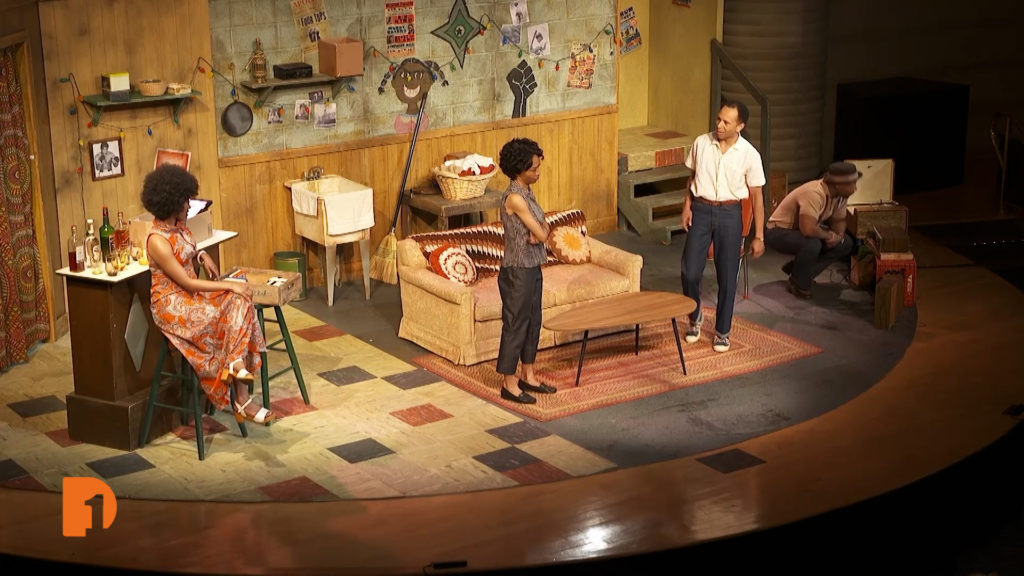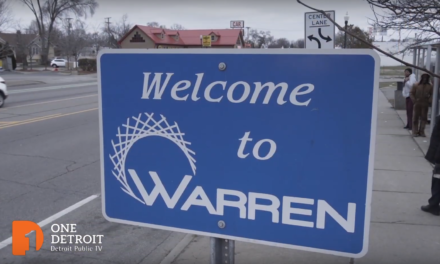As the Detroit 1967 riots began, a revelation was brewing in the city, and what rose from the ashes of the rebellion has ultimately shaped the city and how it functions today. In Dominique Morisseau‘s production of “Detroit ’67,” the questions of race, social justice and progress that took center stage during the Detroit 1967 riots turn inward to see how the civil disturbance intertwined and impacted the lives of one African American family.
The play ran from May 11 – June 5, 2022 in the General Motors Theatre at the Charles H. Wright Museum of African American History, courtesy of the Detroit Public Theatre.
RELATED: View all of One Detroit/American Black Journal’s coverage of the Detroit 1967 riots.

A scene from Dominique Morisseau’s “Detroit ’67” play, performed in the General Motors Theatre at the Charles H. Wright Museum, courtesy of the Detroit Public Theatre.
One Detroit contributor AJ Walker sits down with Detroit Public Theatre Co-Founder and Co-Producing Artistic Director Courtney Burkett to talk about the compassion for community and humanity audiences get from watching the play and how Burkett believes “Detroit ’67” adds to Detroit’s arts and culture scene, and its overall narrative. Plus, Burkett shares news about a new Detroit Public Theatre space opening in the fall of 2022 in Detroit’s Midtown.
Full Transcript:
Aj Walker, Contributor, One Detroit: From your perspective, what is “Detroit 67” about?
Courtney Burkett, Co-Founder and Co-Producing Artistic Director, Detroit Public Theater: Well, “Detroit 67” is about the Poindexter family. It takes place in the family of the Poindexter’s home. The brother and sister have recently inherited this home from their parents and their legacy from their parents. And so, they are really figuring out what the next steps are for them as a family. And while they’re going through kind of a transformational moment as a family, our city is also going through a really transformational moment. And the conflicts that the city is having, find their way right into the Poindexter’s basement. So, it’s really about a family, but it becomes about our whole city.
This is the third time we’ve produced “Detroit 67”, actually. And this is a piece that we plan on going back to time and again. The rebellion, obviously, that took place in our city in Detroit in 1967 has shaped a lot of who we are as a city and how we function. The questions that come up with this play and with what happens in the Poindexter family and in the community in Detroit in 1967 is really powerful, really brings history to life, and gives us kind of a much more intimate understanding of what the people who were really affected by the rebellion and who lived in the neighborhood, what happened in these homes.
Aj Walker: What would you want audiences to take away from having watched this production?
Courtney Burkett: Well, I hope that they would want to see more work by Detroit Public Theater, and I hope that they would really look into who Dominique Morisseau is and what her other plays are about, I’d have to say. I want people to also look at the community differently, to really understand how some of these things happen, how people are affected by the choices that we make. So, really a deeper understanding of our own humanity, is what I would hope for our audience members, and for the humanity of the people around us, and the people in our communities. So, we always hope that our work helps us connect, helps audiences connect with their humanity and with what’s happening in the world.
Aj Walker: I know Dominique can’t be with us today, but is there anything that you think she would want to say if she were able to be here?
Courtney Burkett: I mean, I think that she would tell people to check out Detroit Public Theater. She’s the Executive Artistic Producer of Detroit Public Theater. We’re building a new space in midtown and we’ll be opening with her play, “Mud Row” in the fall. So, if you missed “Detroit 67” this time, you can come see Dominique’s play “Mud Row,”. Her play “Ain’t To Proud”, the musical that she’s doing– that she did on Broadway and was nominated for a Tony Award for, will also be in Detroit this summer with Broadway in Detroit.
Aj Walker: How do you think productions, like “Detroit 67”, add to Detroit’s theater scene and the arts and culture scene of Detroit today?
Courtney Burkett: Yeah, I mean, I think these productions are really important. I mean, Dominique’s plays are being produced all over the country and all over the world. It’s really important to her that these stories are being told in the city. She writes so much about us, about Detroit.
Courtney Burkett: Detroit Public Theater hopes that people will start understanding that the quality of the work that we’re doing here, that we’re able to produce here at Detroit Public Theater, you don’t have to travel for that. You can just come right downtown and see the plays at Detroit Public Theater. So, we’re really trying to produce work that is of the highest caliber and give Detroit audiences the work that they deserve.
Aj Walker: Thank you so much, Courtney. I really appreciate your time today.
Courtney Burkett: Well, thank you so much. It’s really nice to talk with you. I appreciate the time and look forward to seeing you at the theater soon.
Stay Connected:
Subscribe to One Detroit’s YouTube Channel & Don’t miss One Detroit Mondays and Thursdays at 7:30 p.m. on Detroit Public TV, WTVS-Channel 56.
Catch the daily conversations on our website, Facebook, Twitter @DPTVOneDetroit, and Instagram @One.Detroit
View Past Episodes >
Watch One Detroit every Monday and Thursday at 7:30 p.m. ET on Detroit Public TV on Detroit Public TV, WTVS-Channel 56.




